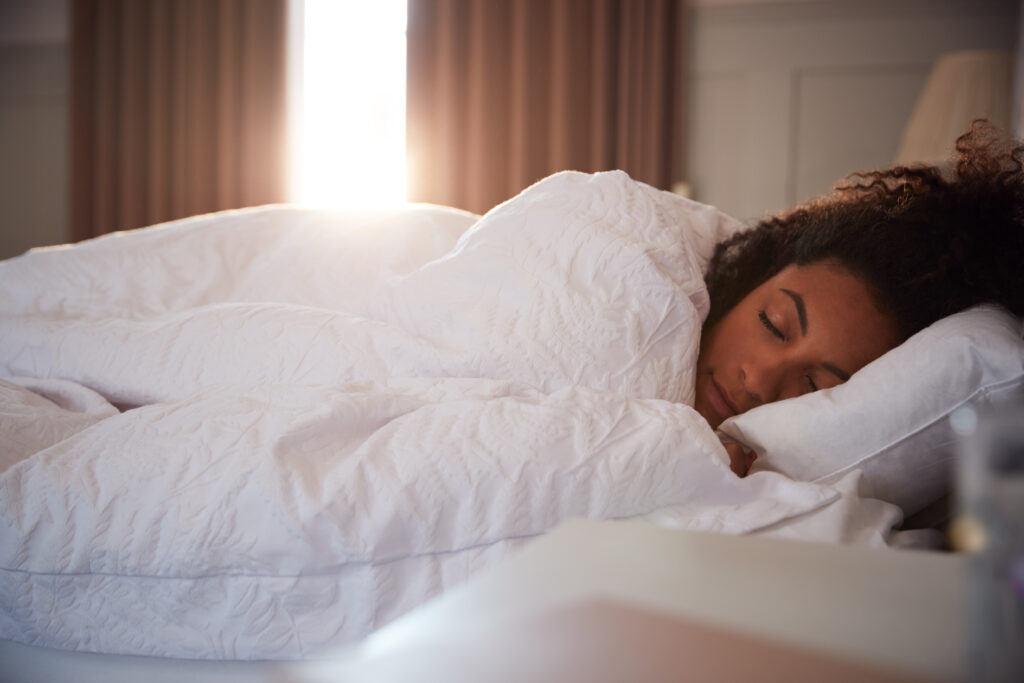Excessive Daytime Sleepiness – Narcolepsy and Idiopathic Hypersomnia

One sign of getting enough of the quality sleep you need is how you feel during the day. Most people know what they look and feel like when they’re refreshed and ready for the day after a good night’s sleep. How we perform during the daytime is usually a sign of how we’ve slept the night before.
When we’re not satisfied with our sleep, it’s time to start taking small steps during the day and the night that can have a big impact on sleep. So, NSF promotes six basic healthy sleep behaviors that are backed by science and can help anyone and every be their Best Slept Self®.
- Spend time in bright light during the day, natural light or equivalent brightness.
- Exercise regularly for a deeper sleep. Aim for 30 minutes a day, 5 days a week.
- Eat your meals at consistent times day after day.
- Avoid heavy meals, nicotine, caffeine, and alcohol before bedtime.
- Use a consistent routine with a relaxing wind-down to help get the sleep you need (7-9 hours for most adults, with same sleep and wake times).
- Put your devices away an hour before bed and sleep in a quiet, cool, and dark environment.
But if you’ve consistently given these steps a chance for a couple of weeks and still don’t feel you’re getting enough of the quality sleep you need, or you notice you have symptoms such as daytime sleepiness, it might be time to seek advice from a healthcare professional. Excessive daytime sleepiness isn’t just about being tired from a poor night’s sleep – it’s a recurring feeling of significant drowsiness that can make it hard to stay alert and awake during the daytime. Sometimes it’s an effect of medicines you are taking, and sometimes it’s even a symptom of a diagnosable condition, including different sleep-wake disorders.
A clinician can help determine if your nighttime sleep disruption or daytime sleepiness are caused by an underlying medical problem. Physical conditions like pain, urinary system issues, and hormonal issues are common sleep disruptors. Depression, anxiety and other mental health conditions are well-documented to travel together with sleep problems. And all of these can have the next-day effects of making you feel tired and not your best. Two of the most common sleep disorders, insomnia and obstructive sleep apnea (OSA; see this link for more information) are clearly connected to feeling tired or sleepy during the day. But there also are more rare sleep disorders that have the hallmark characteristics of excessive daytime sleepiness.
Two of these more rare conditions are narcolepsy and idiopathic hypersomnia (IH). Diagnosing and treating these conditions usually needs expert attention from sleep medicine specialists.
Narcolepsy is a rare neurological disorder affecting the sleep-wake cycle. It’s characterized by excessive daytime sleepiness and other symptoms such as cataplexy (a sudden loss of muscle control), disrupted nighttime sleep, hallucinations, and sleep paralysis. Recognizing and diagnosing narcolepsy early is important. Diagnosis involves physical examinations and specialized sleep studies. Although there is no cure, prescription medicines have been approved by the FDA to treat a range of symptoms. FDA approved medicines for narcolepsy include:
- modafinil / armodafinil
- dextroamphetamine / mixed amphetamine salts
- methylphenidate
- high-sodium oxybates
- low-sodium oxybate
- pitolisant
- solriamfetol
Along with medicines, living with and managing narcolepsy often includes other approaches like practicing basic healthy sleep behaviors, cognitive-behavioral and psychological support therapies, and even accommodations in workplace or educational settings.
Idiopathic Hypersomnia (IH) is a rare sleep disorder that causes excessive daytime sleepiness despite sufficient nighttime sleep. It’s different from narcolepsy. When compared to the experience with narcolepsy, people with idiopathic hypersomnia (IH) tend to sleep longer at night and may find it challenging to wake up because of prolonged confusion upon awakening (known as sleep inertia). Even though they may sleep longer, people with IH typically report they don’t feel refreshed after sleep. What’s more, they may take long naps and still feel unrefreshed afterward. Diagnosing IH involves ruling out other conditions and calls for a sleep medicine specialist to perform a sleep study. Treatment focuses on symptom management with medications, and though several types of stimulants are often prescribed off-label for IH, only recently was low-sodium oxybate approved for this use by FDA. It is taken by mouth either once or twice a night. Here too, adopting healthy sleep behaviors that help with consistency and regular sleep patterns can be appropriate for people with IH. Addressing broader behavioral and environmental factors is crucial. More research may show how cognitive-behavioral therapy, sleep regulation, physical activity, scheduled napping, and dietary adjustments complement medication and offer their own benefits in treatment for IH.
This content was produced independently by the National Sleep Foundation and brought to you by Avadel Pharmaceuticals and Jazz Pharmaceuticals, sponsors of the 2024 Sleep Awareness Week® campaign.
A message from our sponsors:

Avadel is a biopharmaceutical company focused on transforming medicine to transform lives.

Jazz Pharmaceuticals is a global biopharmaceutical company with the purpose to innovate to transform the lives of patients and their families.
